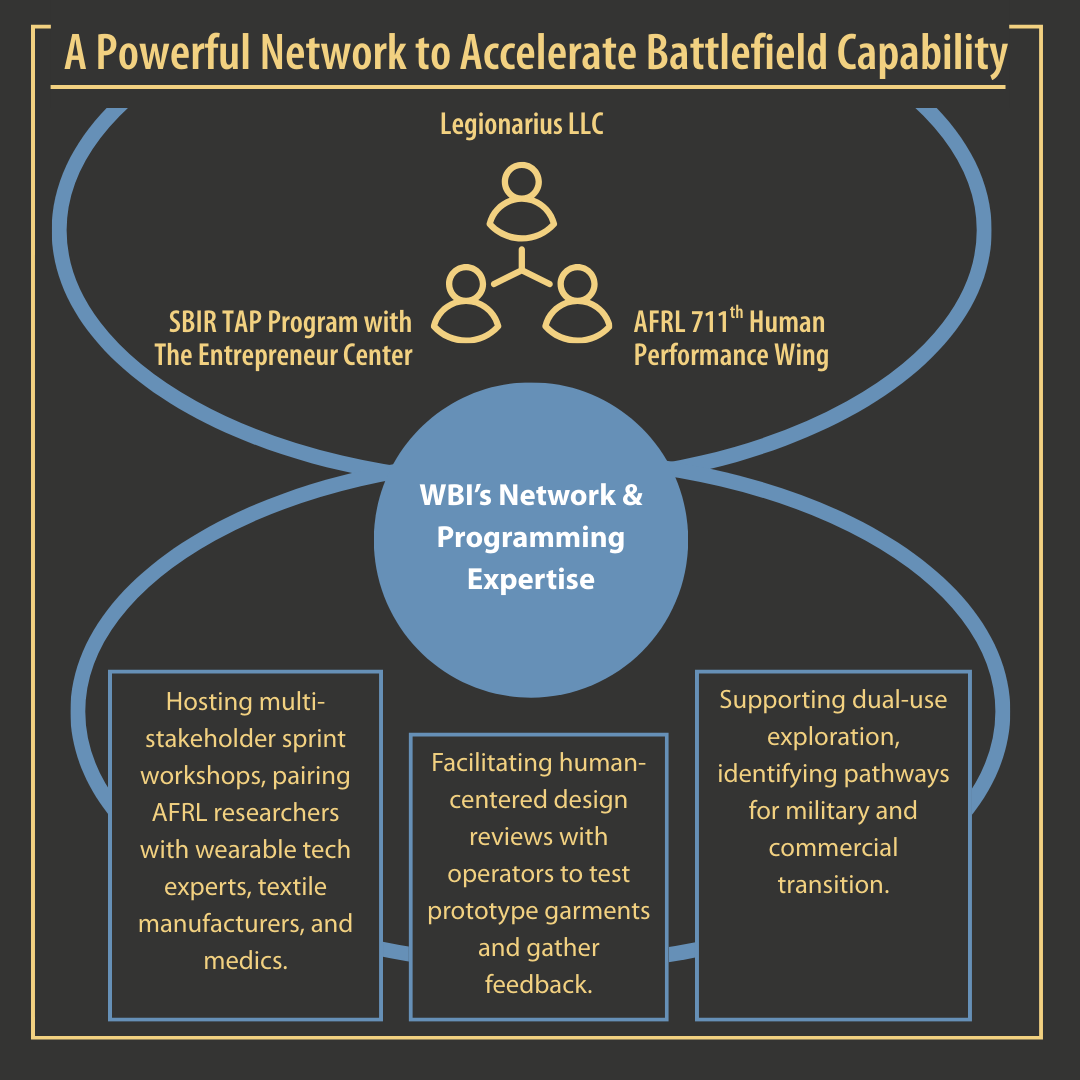WBI’s Support for Smart Wearables Moves Closer to Field-Ready Status
The future battlefield emphasizes not just weaponry but real-time information—particularly insights into warfighters’ health and resilience. Wright Brothers Institute (WBI), a mission-focused innovation partner to the Air Force Research Laboratory (AFRL), has been pivotal in advancing two revolutionary technologies: the Legionarius Smart Garment and the Battlefield Assisted Trauma Distributed Observation Kit (BATDOK).
The Legionarius Smart Garment integrates biometric sensors into clothing worn by Airmen and Guardians. This system monitors vital signs such as heart rate, respiration, core temperature, hydration, and fatigue levels, providing commanders and medics with real-time situational awareness of warfighter performance and risk.
Programs designed and administered by Wright Brothers Institute have been instrumental in the promising success of Legionarius LLC, whose “smart garment” is poised to change the field of battle by sensing penetrating wounds and burns while simultaneously alerting medical support. A two-time Small Business Innovation Research (SBIR)-awarded small business, positioned Legionarius to work with defense and commercial partners and facilitated the company’s development of this game-changing wearable technology.
SBIR TAP: Accelerating Innovation with WBI
In January 2022, Legionarius was selected for the SBIR TAP (Technology Acceleration Program)—a flagship initiative from WBI and The Entrepreneurs Center, funded by AFWERX Ventures and tailored for SBIR awardees. This no-cost, equity-free cohort program helped Legionarius refine its business model, develop commercialization strategies, and build meaningful relationships across the Air Force innovation ecosystem.
During SBIR TAP, the company sharpened its value proposition, explored both commercial and DoD markets, and learned from entrepreneurial mentors and transition experts such as SBIR Ventures’ Technology Broker Eric Hill. These connections proved crucial.
In February 2022, Mr. Hill collaborated with René Meadors, WBI’s Industry Outreach Program Manager, to explore ways Legionarius could align its SBIR technology development goals with AFRL technologies. Ms. Meadors, in coordination with AFRL’s Office of Research and Technology Applications (ORTA), plays a vital role in transitioning AFRL-developed IP to small businesses, enabling scalable commercialization and warfighter impact.
This collaboration paid off quickly. On March 15, 2022, Legionarius signed an Information Technology Agreement (ITA) with AFRL’s 711th Human Performance Wing, allowing access to critical datasets necessary for prototyping and iteration. The agreement laid the groundwork for a future Cooperative Research and Development Agreement (CRADA), enhancing the likelihood of long-term integration and transition.
“Over the past few years, our collaboration with the Wright Brothers Institute has been essential for us as an early-stage startup to get connected to end-user groups and stakeholders within the Air Force community,” said Dr. Alex Gruentzig, CTO and co-founder of Legionarius LLC. “From our initial TechWarrior demonstration through SBIR TAP, WBI has supported our technical development and facilitated collaboration with AFRL and AFWERX. Their role in setting up our updated ITA with AFRL was especially critical.”
While Legionarius collects physiological data, BATDOK turns it into actionable medical insight. Developed by AFRL's 711th Human Performance Wing, BATDOK is a mobile application that allows medics to monitor multiple patients in real time, improve triage accuracy, and ensure seamless care during evacuation.
Key capabilities include:
• Sensor integration with wearable platforms like Legionarius.
• Hands-free patient tagging using Bluetooth and QR codes.
• Offline operation in disconnected or austere environments.
“BATDOK gave me eyes on every casualty in seconds,” said TSgt. Ronald Shurer II, U.S. Air Force Pararescueman and Medal of Honor recipient, during a product feedback session. “I could monitor vitals, tag injuries, and prep evac teams—all from one device.”
Since deployment:
• BATDOK has reduced triage time by up to 40%, according to AFRL field studies.
• It is actively fielded with Air Force Special Operations Command and U.S. Special Operations Forces.
• The U.S. Air Force Medical Service recognized BATDOK as a “game-changing capability for combat medicine.”
“BATDOK is a best-in-class operational medical tool. It streamlines care in the most chaotic environments.”
— Lt. Col. K. Michael Gibbons, AFRL Biomedical Engineer
In June 2024, Legionarius collaborated with goTenna, a company that provides unique, off-the-grid encrypted communication capabilities to enhance operational effectiveness across a variety of mission spaces, to demonstrate the integration of their Smart Garments. The integration with goTenna’s Pro X2 device and the Android Team Awareness Kit (ATAK) showcased the impact of remote situational awareness and intervention in treating hemorrhaging wounds from gunshots, shrapnel, or explosives.
The successful pairing of Legionarius Smart Garments with goTenna's off-grid network enabled instant transmission of crucial wound and health data, ensuring immediate support from teammates and significantly enhancing mission success and safety. This breakthrough optimized medical responses and resources, eliminating the need for costly satellite communications or easily detectable radio voice transmissions.
The integration allowed for:
Real-time transmission of wound data, vital signs, and medevac requests.
Enhanced situational awareness through ATAK, displaying the location and status of injured personnel.
Improved decision-making during the critical "platinum five minutes" following injury.
“This exercise shows how Legionarius and goTenna can transform health monitoring by allowing users to instantly send vital data to their teammates or to their chain of command, fostering prompt responses that can mean the difference between life and death.”
— Dr. Alexander Gruentzig, Co-Founder of Legionarius
Legionarius and BATDOK are reshaping how the Air Force approaches human performance and battlefield medicine. They reflect a shift toward smart, data-driven solutions—and with WBI’s help, they’re not just research projects. They’re real-world capabilities, already making a difference on the ground.

